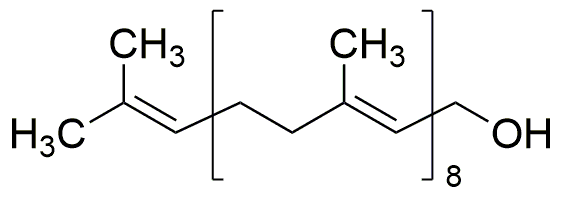Solanesol is widely utilized in research focused on:
- Pharmaceutical Development: This compound is a key ingredient in the synthesis of various pharmaceutical products, particularly in the formulation of drugs targeting neurological disorders. Its unique structure enhances bioavailability, making it a preferred choice in drug design.
- Cosmetic Applications: Solanesol is used in the cosmetic industry for its moisturizing properties. It acts as an effective emollient in creams and lotions, helping to improve skin hydration and texture.
- Food Industry: As a natural antioxidant, it is incorporated into food products to enhance shelf life and maintain flavor integrity. Its application in food preservation is particularly beneficial for products prone to oxidation.
- Biotechnology: In research settings, solanesol serves as a valuable tool for studying cellular processes and membrane dynamics due to its ability to interact with lipid bilayers, providing insights into cell membrane behavior.
- Renewable Energy: This compound is explored in the development of organic solar cells, where it contributes to improved energy conversion efficiency, making it a promising candidate for sustainable energy solutions.
General Information
Properties
Safety and Regulations
Applications
Solanesol is widely utilized in research focused on:
- Pharmaceutical Development: This compound is a key ingredient in the synthesis of various pharmaceutical products, particularly in the formulation of drugs targeting neurological disorders. Its unique structure enhances bioavailability, making it a preferred choice in drug design.
- Cosmetic Applications: Solanesol is used in the cosmetic industry for its moisturizing properties. It acts as an effective emollient in creams and lotions, helping to improve skin hydration and texture.
- Food Industry: As a natural antioxidant, it is incorporated into food products to enhance shelf life and maintain flavor integrity. Its application in food preservation is particularly beneficial for products prone to oxidation.
- Biotechnology: In research settings, solanesol serves as a valuable tool for studying cellular processes and membrane dynamics due to its ability to interact with lipid bilayers, providing insights into cell membrane behavior.
- Renewable Energy: This compound is explored in the development of organic solar cells, where it contributes to improved energy conversion efficiency, making it a promising candidate for sustainable energy solutions.
Documents
Safety Data Sheets (SDS)
The SDS provides comprehensive safety information on handling, storage, and disposal of the product.
Product Specification (PS)
The PS provides a comprehensive breakdown of the product’s properties, including chemical composition, physical state, purity, and storage requirements. It also details acceptable quality ranges and the product's intended applications.
Certificates of Analysis (COA)
Search for Certificates of Analysis (COA) by entering the products Lot Number. Lot and Batch Numbers can be found on a product’s label following the words ‘Lot’ or ‘Batch’.
*Catalog Number
*Lot Number
Certificates Of Origin (COO)
This COO confirms the country where the product was manufactured, and also details the materials and components used in it and whether it is derived from natural, synthetic, or other specific sources. This certificate may be required for customs, trade, and regulatory compliance.
*Catalog Number
*Lot Number
Safety Data Sheets (SDS)
The SDS provides comprehensive safety information on handling, storage, and disposal of the product.
DownloadProduct Specification (PS)
The PS provides a comprehensive breakdown of the product’s properties, including chemical composition, physical state, purity, and storage requirements. It also details acceptable quality ranges and the product's intended applications.
DownloadCertificates of Analysis (COA)
Search for Certificates of Analysis (COA) by entering the products Lot Number. Lot and Batch Numbers can be found on a product’s label following the words ‘Lot’ or ‘Batch’.
*Catalog Number
*Lot Number
Certificates Of Origin (COO)
This COO confirms the country where the product was manufactured, and also details the materials and components used in it and whether it is derived from natural, synthetic, or other specific sources. This certificate may be required for customs, trade, and regulatory compliance.

